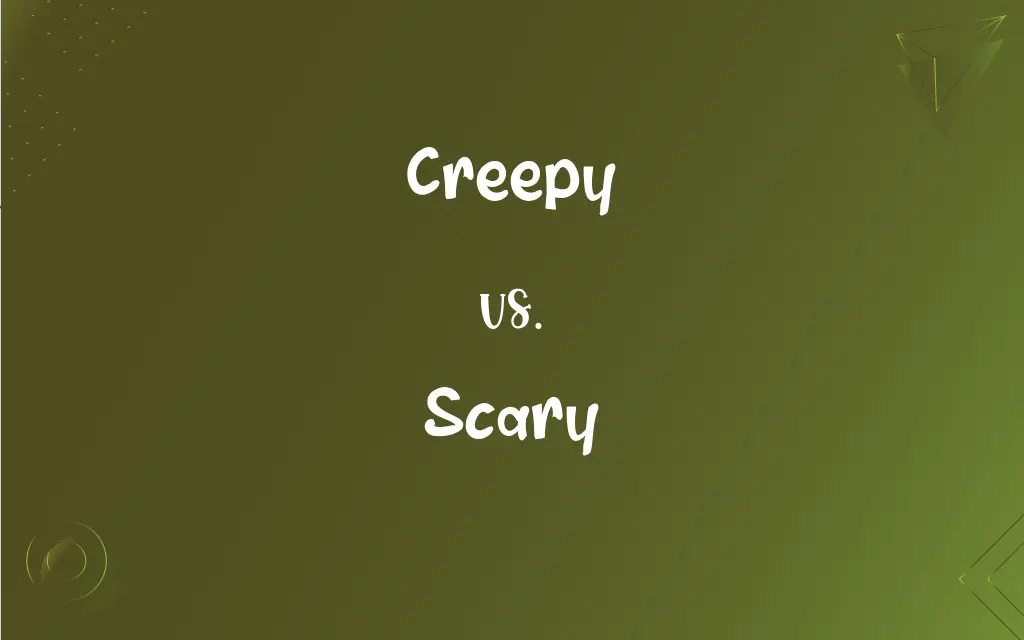Creepy vs. Scary: What's the Difference?
Edited by Aimie Carlson || By Janet White || Updated on October 3, 2023
Creepy gives a feeling of unease or discomfort, while scary evokes intense fear or terror.

Key Differences
Creepy and scary both elicit feelings of discomfort and fear, but they do so in different degrees and manners. Creepy typically implies a more subtle, lingering sense of unease or discomfort, often associated with things that are unsettling but not overtly dangerous. Scary, meanwhile, usually denotes something that is actively threatening or causing intense fear.
The sensation of something being creepy might arise from an uncanny valley feeling, where something appears almost, but not quite, human or familiar. An old, abandoned house might feel creepy because of the eerie silence and the sense of something being "off". Scary situations, on the other hand, pose a more immediate threat. A growling dog charging at someone can be described as scary because of the immediate danger it presents.
While creepy situations or objects might make someone's skin crawl, they don't necessarily cause the adrenaline rush that scary situations often induce. A doll with lifelike eyes can be creepy, as its resemblance to a living being might be unsettling. Conversely, being alone in the woods and hearing a wild animal can be scary, as the immediate danger is more pronounced.
In film and literature, creepy atmospheres are often built through suspense, unsettling details, or strange behaviors. Scary moments, however, usually involve immediate threats or jump scares. Think of creepy as a slow, lingering unease, while scary is an intense, immediate fear.
Sometimes, the lines between creepy and scary can blur. For instance, a ghostly figure seen from a distance might initially be creepy, but it becomes scary when it suddenly appears up close. Yet, in essence, while both words relate to fear, they pinpoint different shades of this emotion.
ADVERTISEMENT
Comparison Chart
Intensity
Subtle, lingering unease
Intense, immediate fear
Common associations
Uncanny valley, unsettling details
Immediate danger, overt threats
Response
Discomfort, "skin crawl" sensation
Adrenaline rush, heightened alertness
Use in media
Built through suspense, unsettling atmospheres
Jump scares, clear dangers
Type of fear
More psychological, often not directly dangerous
Actively threatening, causing direct fear
ADVERTISEMENT
Creepy and Scary Definitions
Creepy
Making the skin crawl, often without a clear reason.
The whispers in the old mansion were incredibly creepy.
Scary
Relating to an overt or clear threat.
It's scary how fast the floodwaters are rising.
Creepy
Provoking discomfort without an overt threat.
The empty playground at night felt creepy.
Scary
Provoking feelings of dread or apprehension.
The news about the hurricane approaching is scary.
Creepy
Causing a subtle feeling of unease or discomfort.
The old portrait's eyes had a creepy, lifelike stare.
Scary
Evoking a strong desire to escape or avoid a situation.
The sight of the snake was scary for the hikers.
Creepy
Unsettling due to being eerily lifelike or too familiar.
The robot's human-like movements were undeniably creepy.
Scary
Causing intense fear or terror.
The thunderstorm was so intense, it was scary.
Creepy
Eliciting a sensation of something being "off" or not quite right.
The music box played a creepy, slowed-down tune.
Scary
Causing fright or alarm.
Creepy
Of or producing a sensation of uneasiness or fear, as of things crawling on one's skin
A creepy feeling.
A creepy story.
Scary
Easily scared; very timid.
Creepy
Annoyingly unpleasant; repulsive
The creepy kids next door.
Scary
Causing fear or anxiety
The tiger's jaws were scary.
She was hiding behind her pillow during the scary parts of the film.
Creepy
Moving by creeping along.
Scary
(informal) Uncannily striking or surprising.
Linda changed her hair, and it’s scary how much she looks like her mother.
Creepy
(informal) Producing an uneasy fearful sensation, as of things crawling over one's skin.
Scary
Subject to sudden alarm; easily frightened.
Creepy
(informal) Feeling an uneasy fearful sensation; creeped out.
Scary
(informal) To a scary extent; scarily.
Creepy
(informal) Strangely repulsive.
That creepy old man keeps leering at me!
Scary
Barren land having only a thin coat of grass.
Creepy
Crawly; having or producing a sensation like that caused by insects creeping on the skin.
One's whole blood grew curdling and creepy.
Scary
Barren land having only a thin coat of grass.
Creepy
Annoying and unpleasant;
Some creepy kids were bothering her
Scary
Subject to sudden alarm.
Creepy
Causing a sensation as of things crawling on your skin;
A creepy story
I had a creepy-crawly feeling
Scary
Causing fright; alarming.
Scary
So scary as to cause chills and shudders;
The most terrible and shuddery...tales of murder and revenge
Scary
Inducing a rush of adrenaline due to fear.
The movie had several scary jump scares.
FAQs
Can a situation be both creepy and scary?
Yes, certain situations can evoke both a sense of unease (creepy) and immediate fear (scary).
Would a lifelike doll be termed creepy or scary?
A lifelike doll would typically be termed creepy because of its uncanny resemblance.
Which word describes a more subtle feeling, creepy or scary?
Creepy describes a more subtle, lingering feeling of unease.
Is a jump scare in a movie more likely to be described as creepy or scary?
A jump scare is more likely to be described as scary.
Is a creaky door in an old house creepy or scary?
It's often considered creepy due to the subtle unease it evokes.
Can a person's behavior be described as creepy?
Yes, unsettling or inappropriate behavior can be described as creepy.
Which emotion is more intense, creepy or scary?
Scary denotes a more intense, immediate emotion of fear.
Can certain animals be considered creepy?
Yes, some people find creatures like spiders or certain insects to be creepy.
Which term, between creepy and scary, deals more with immediate danger?
Scary deals more directly with immediate danger or threats.
If someone is afraid to walk alone at night, is their fear creepy or scary?
Their fear would typically be described as scary due to the potential immediate dangers.
Is the concept of the "uncanny valley" more related to creepy or scary?
The "uncanny valley" concept is more related to creepy.
In horror films, are ghosts typically creepy or scary?
It can vary, but ghosts often start as creepy entities and become scary when they pose a direct threat.
Would a haunted house attraction aim to be creepy or scary?
Such attractions often aim to be both, starting with a creepy atmosphere and building up to scary moments.
Can a place's atmosphere be described as creepy?
Yes, places with eerie silences or unsettling vibes can have a creepy atmosphere.
Is the fear of the unknown more creepy or scary?
The fear of the unknown can be both; it's creepy due to uncertainty and scary because of potential dangers.
Would unexpected noises in a house be creepy or scary?
Such noises can be creepy if their source is unknown, but become scary if identified as a direct threat.
How does context influence the use of creepy vs. scary?
Context is crucial. An object might be creepy in one setting and scary in another based on surrounding circumstances.
Are children more likely to use the term creepy or scary?
Children might use both terms, but are more likely to label immediate threats as scary.
Can music be described as creepy?
Yes, certain types of music, especially suspenseful or discordant tunes, can be described as creepy.
Is a roller coaster ride more likely to be described as creepy or scary?
A roller coaster ride is more often described as scary due to the adrenaline rush it provides.
About Author
Written by
Janet WhiteJanet White has been an esteemed writer and blogger for Difference Wiki. Holding a Master's degree in Science and Medical Journalism from the prestigious Boston University, she has consistently demonstrated her expertise and passion for her field. When she's not immersed in her work, Janet relishes her time exercising, delving into a good book, and cherishing moments with friends and family.
Edited by
Aimie CarlsonAimie Carlson, holding a master's degree in English literature, is a fervent English language enthusiast. She lends her writing talents to Difference Wiki, a prominent website that specializes in comparisons, offering readers insightful analyses that both captivate and inform.































































